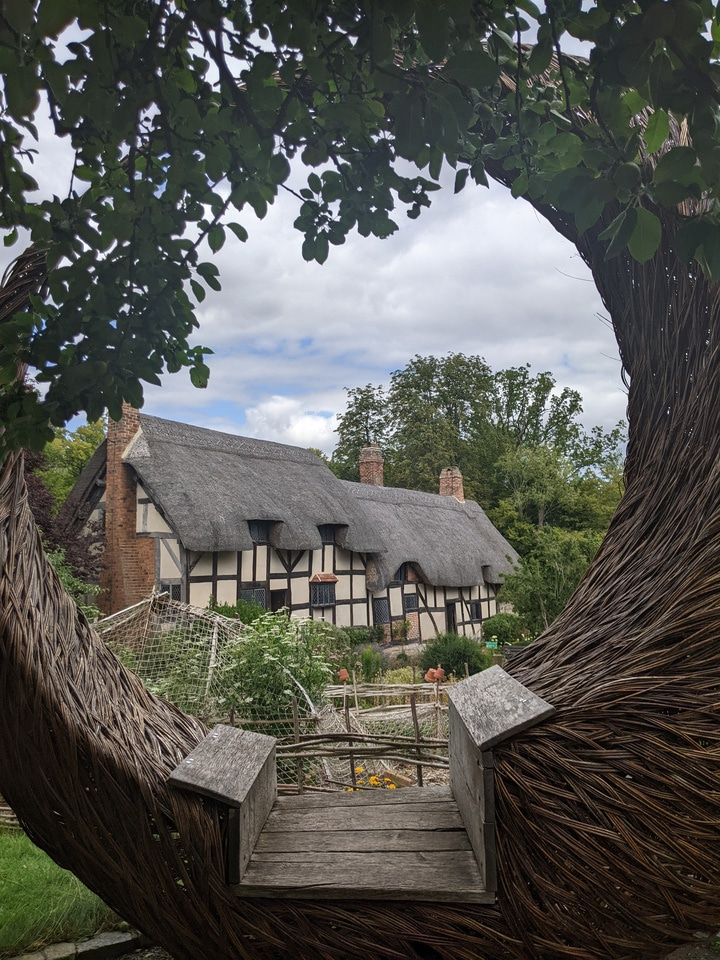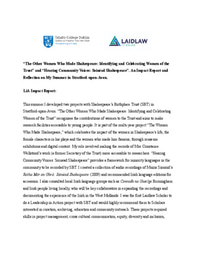LiA Showcase: 'The Other Women Who Made Shakespeare' and 'Hearing Community Voices: Soinéid Shakespeare.'

This summer I worked with the Collections department of Shakespeare’s Birthplace Trust (SBT) in Stratford-upon-Avon to develop two outreach archival projects. The first was titled ‘The Other Women Who Made Shakespeare: Identifying and Celebrating Women of the Trust.’ It was designed to shed light on women who contributed to the foundation and legacy of the Trust but had been overlooked in the historical records and to make research facilities more accessible to the community. Following this, I developed a second project called ‘Hearing Community Voices: Soinéid Shakespeare’ which created a framework where all languages used in the communities served by the Collections are accessible and well documented, focusing at first on the Irish language and culture.
As part of the first project, I was invited to support a translation workshop with a local secondary school where students examined various translated works of Shakespeare. I recorded the knowledge they shared for the department and presented an Irish language item. I realised that the Collections, which act as an archive for the communities of the West Midlands, not just housing material related to Shakespeare, only had two Irish language items. I reached out to members of the local Irish community, who shared their experiences with me. Some expressed the feeling that their culture is not well represented in the Collections and that they would like this to change. This project therefore had two strands: creating audio recordings for Muiris Síonóid’s Rotha Mór an Ghrá: Soinéid Shakespeare (Crigeán Press, 2009), read by local Irish speakers and consulting with Irish language groups to find items they would like the Collections to house. ‘Hearing Community Voices’ has now been embedded as a project which the Trust will continue to run with me, until the local minority language communities are satisfied that their contributions to the area have been appropriately represented and credited in the Collections.
I learned an enormous amount about the relationship between the town and the Trust. Cultural tourism is a controversial and critical element of the local economy, which some residents feel obscures the complexities of the community. There is a visible wealth gap with people from very different socio-economic situations living in close proximity with each other. There are certain disadvantages that can be invisible to the eye of a tourist, such as access to education. I helped run a workshop between Collections and the Stratford Youth Hub for children who had additional learning needs and required a level of emotional support that they could not find in mainstream education. I met children who were either attending school on a limited timetable or were not in any kind of formal education system, who were invited to the Reading Room to learn how they can access its resources. Many of the educational outreach projects and online resources that the Trust operate depend on the money generated by visitors and donations, as they do not receive government funding. The Pandemic has had a damaging impact on these services.
I also learned about what an Irish woman living in Stratford for 30 years described to me as the ‘hidden Irish’, and how the opportunities and life she has built in England also came with difficulties. Some negative attitudes and assumptions about Irish people continue to exist. I learned how they can feel quite isolated by a culture that might appear to be similar but is in fact very different. The language, the humour, the way in which knowledge is stored and communicated. In particular, the feeling that the impact of colonialism is not acknowledged. Few people I spoke with had confidence in the value of their personal level of the Irish language. This project values all levels, dialects and backgrounds of Irish speakers.
I think this project has highlighted to the Trust that the Irish community feels underrepresented. Through communication with Irish residents and Conradh na Gaeilge Birmingham, links between the community and the Trust have been established. Conradh na Gaeilge Birmingham have agreed to create recordings of Muiris Síonóid’s Sonnets in Irish. They will communicate with the Trust to curate Irish language and cultural items to be included in the Collections. I have suggested further Irish translations and adaptations of Shakespeare’s works to the Trust. I also created a collection of twenty recordings of Síonóid’s Sonnets as Gaeilge which the community can use as a resource to expand according to their needs. I think the ‘passive policy’ towards the accession of translated works has been highlighted as something to revise. This project has created a straightforward framework which any ethnic/cultural group can use to promote their representation. The recordings make Síonóid’s items more accessible to people who are visually impaired. It gives anyone with an interest in learning Irish access to our oral tradition and the sound of the language. It reminds communities that they have agency. Their representation is not an institution-approved narrative that is forced upon them.
I have met fantastic, talented people at the forefront of Shakespeare Studies and social outreach who work extremely hard to ensure that Shakespeare’s complex legacy is an inclusive one that opens doors for everyone interested in the arts and education. My hope is that these projects will have long term benefits for the SBT Collections and all the communities they serve.





Please sign in
If you are a registered user on Laidlaw Scholars Network, please sign in